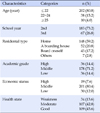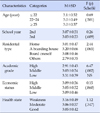Abstract
Purpose
The purpose of this study was to identify the level of dietary behavior in nursing students and also, to investigate factors that influence dietary behavior.
Methods
In this study, 250 nursing students who were enrolled in a university school in B city, Korea and who gave written consent completed the questionnaire. The data were collected between June 22 and 30, 2015 and analyzed using t test, one way ANOVA, Pearson correlation coefficients and multiple regression.
Figures and Tables
Table 2
Degree of Nutrition Knowledge, Health Concern, Dietary Self-efficacy and Dietary Behavior (N=250)

References
1. Lee JH, Kim JS, Lee MY, Chung SH, Chang KJ. A study on weight control experience, eating disorder and nutrient intake of college students attending web class via the internet. Korean J Community Nutr. 2001; 6(4):604–616.
2. Lee YJ, Song KH. A study on the body fat content and serum lipids in college students. J Korean Soc Food Sci Nutr. 1996; 25(1):11–20.
3. Kim IS, Yu HH, Han HS. Effects of nutrition knowledge, dietary attitude, dietary habits and life style on the health of college students in the Chungnam area. Korean J Community Nutr. 2002; 7(1):45–57.
4. Ko MS. The comparison in daily intake of nutrients and dietary habits of college students in Busan. Korean J Community Nutr. 2007; 12(3):259–271.
5. Oh HS, Min SH. A study on dietary attitude of college students in Wonju area. Korean J Food Cult. 2001; 16(3):215–224.
6. Ma Y, Bertone ER, Stanek EJ, Reed GW, Hebert JR, Cohen NL, et al. Association between eating patterns and obesity in a free-living US adult population. Am J Epidemiol. 2003; 158(1):85–92. DOI: 10.1093/aje/kwg117.

7. Breslow L, Enstrom JE. Persistence of health habits and their relationship to mortality. Prev Med. 1980; 9(4):469–483.

8. Speake DL, Cowart ME, Pallet K. Health perceptions and lifestyles of the elderly. Res Nurs Health. 1989; 12(2):93–100.

9. Chin JH, Chang KJ. College students' attitude toward body weight control, health-related lifestyle and dietary behavior by self-perception on body image and obesity index. J Korean Soc Food Sci Nutr. 2005; 34(10):1559–1565. DOI: 10.3746/jkfn.2005.34.10.1559.

10. Kim KH. A study of the dietary habits the nutritional knowledge and the consumption patterns of convenience foods of university students in the Gwangju area. Korean J Community Nutr. 2003; 8(2):181–191.
11. Moynihan PJ, Mulvaney CE, Adamson AJ, Seal C, Steen N, Mathers JC, et al. The nutrition knowledge of older adults living in sheltered housing accommodation. J Hum Nutr Diet. 2007; 20(5):446–458.

12. Bandura A. Self efficacy toward a unifying theory of behavioral change. Psychol Rev. 1977; 84(2):191–215.
13. Gu MO, Yu JS, Kweon IK, Kim HW, Lee EO. A review of research on self efficacy theory applied to health related behavior. J Korean Acad Nurs. 1994; 24(2):278–302.

14. Lee JS, Yun JW. Astudy on perception about body image, dietary attitude, dietary self-efficacy and nutrient intake of high school students in Busan. J Korean Soc Food Sci Nutr. 2003; 32(2):295–301.
15. Kwon SY, Han JI, Chung YJ. Relationship of nutritional knowledge, dietary self efficacy and change of dietary behavior of nutrition professional. Korean J Nutr. 2008; 41(6):550–560.
16. Schnoll R, Zimmerman BJ. Self-regulation training enhance dietary self-efficacy and dietary fiber consumption. J Am Diet Assoc. 2001; 101(9):1006–1011. DOI: 10.1016/S0002-8223(01)00249-8.

17. Zrinyi M, Juhasz M, Balla J, Katona E, Ben T, Kakuk G, et al. Dietary self-efficacy: determinant of compliance behaviours and biochemical outcomes in haemodialysis patients. Nephrol Dial Transplant. 2003; 18(9):1869–1873. DOI: 10.1093/ndt/gfg307.

18. Pawlak R, Colby S. Benefits, barriers, self-efficacy and knowledge regarding healthy foods: perception of African Americans living in eastern North Carolina. Nutr Res Pract. 2009; 3(1):56–63. DOI: 10.4162/nrp.2009.3.1.56.

19. Lee JR, Um YH. Astudy of attitude toward healthmenu. Korean J Culinary Res. 2004; 10(2):16–29.
20. Gang MH. Relationship between eating behavior and self-esteem of college nursing students. J Korean Acad Public Health Nurs. 2010; 24(1):126–134.
21. An HM. Effect of public media's nutrition information on nutrition knowledge and dietary behavior of university students [master's thesis]. [Gyeongsan]: Yeungnam University;2011. 67.
22. Kim MN. Adolescent's dietary behavior, health interest, nutrition knowledge: its effects on their intakes of nutritional supplements [master's thesis]. [Seoul]: Hanyang University;2103. 87.
23. Choi SJ. Dietary self-efficacy and physical activity self-efficacy among elementary school children [master's thesis]. [Seoul]: Seoul National University;1998. 74.
24. Son SE, Kim HS, Kim JM. Relationship among dietary self-efficacy, social support, depression, and weight-control behavior of children and adolescents. Korean J Community Living Sci. 2014; 25(4):473–486. DOI: 10.7856/kjcls.2014.25.4.473.

25. Kim KW, Shin EM, Moon EH. A study fast food consumption, nutritional knowledge, food behavior and dietary intake of university students. J Korean Diet Assoc. 2004; 10(1):13–24.
26. Hwang JH, Lee HM. A study on lifestyles, dietary habits, nutrition knowledge and dietary behaviors of male university students according to residence type. Korean J Community Nutr. 2007; 12(4):381–395.
27. Kim SY, Lee HM, Song KH. Body image recognition and dietary behaviors of college students according to the body mass index. Korean J Community Nutr. 2007; 12(4):3–12.
28. Lee JY. A study on the effect of the nutrition education program on the dietary self-efficacy and dietary practice for elementary school children. J Korean Public Health Nurs. 2004; 18(1):132–142.
29. Choi JE, Kim YG. The relationship between university students' nutrition knowledge, dietary self-efficacy, dietary habits and menu choice behavior. J Foodserv Manage. 2012; 15(6):249–275.
30. Lee JS. The effect of gender, obesity rate, nutrition knowledge and dietary attitude on the dietary self-efficacy of adolescents. Korean J Community Nutr. 2003; 8(5):652–657.




 PDF
PDF ePub
ePub Citation
Citation Print
Print






 XML Download
XML Download